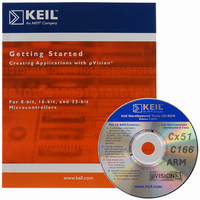CA51 Keil, CA51 Datasheet - Page 2

CA51
Manufacturer Part Number
CA51
Description
KIT COMPILER FOR 8051 MCU FAMILY
Manufacturer
Keil
Type
Compilerr
Datasheet
1.CA51.pdf
(4 pages)
Specifications of CA51
For Use With/related Products
8051 MCU Family
Lead Free Status / RoHS Status
Lead free / RoHS Compliant
Available stocks
Company
Part Number
Manufacturer
Quantity
Price
Company:
Part Number:
CA51001-0018
Manufacturer:
FUJI
Quantity:
1 000
Company:
Part Number:
CA51001-0275
Manufacturer:
FUJI
Quantity:
1 000
Company:
Part Number:
CA51001-0296
Manufacturer:
FUJI
Quantity:
1 000
Company:
Part Number:
CA51006R800JE05
Manufacturer:
PULSE
Quantity:
352
Company:
Part Number:
CA511
Manufacturer:
M/A-COM
Quantity:
5 000
Part Number:
CA5130AM
Manufacturer:
INTERSIL
Quantity:
20 000
Part Number:
CA5160AE
Manufacturer:
HARRIS
Quantity:
20 000
Development Tools Overview
Cx51 Compiler
The Keil 805 1 and 25 1 development kits contain different C
Compilers for optimum support of device variants. Cx5 1 is
used as a generic term for:
The Cx5 1 Compiler gives complete access to all hardware
components within your C source code. For example, you can
control peripherals using SFR registers, write optimum interrupt
code with CPU register banks, accelerate variable access with
the data, idata, or pdata memory type, and use efficient bit
operations or atomic bit manipulation.
805 1 devices provide various physical memory spaces: fast
DATA space, up to 1 6MB large XDATA space, and CODE space
for constants. F
LX51 Extended Linker
The standard Code Banking Linker lets you increase the
program space of a classic 805 1 device beyond 64KB. The LX5 1
Extended Linker expands device support and adds further
functionality to the Keil Cx5 1 Compiler:
2
C5 1 Compiler for classic 805 1 devices, 805 1 IP cores, Dallas
Contiguous Mode, and other extended devices
CX5 1 Compiler for Philips 805 1 MX and SmartMX
C25 1 Compiler for 25 1 devices and 25 1 IP cores
Three well-defined memory models that provide the default
memory allocation for variables
Generic pointers that access all memory spaces
Memory types that control the space for variables or pointer
accesses. Memory-specific pointers reduce RAM
requirements, and optimize program execution
Linker Code Packing analyzes an entire application and
generates sub-routines for common code blocks even on
code banking applications. Short AJMP and ACALL
instructions replace longer LJMP and LCALL when possible
Incremental Linkage allows you to split programs into
several functional parts as it is required for multi-application
programming or FLASH ROM updates
Far Memory Support gives you access to 1 6MB of
variable space even on a classic 805 1 device and the far
memory type may be used for special memory types
Detailed Data Type Checking is performed across all
public symbol definitions and improves software quality
Keil 8051/25 Development Tools
or flexible memory usage,
1
Cx5 1 offers:
RTX Tiny2 Real-Time Kernel
The RTX Tiny2 multi-tasking real-time kernel makes
implementing complex, time-critical software projects easy. RTX
Tiny2 is royalty-free and is fully integrated into the Keil Cx5 1
tool chain. It works on all classic 805 1 device variants, and
supports multiple DPTR and arithmetic units.
RTX Tiny2 is the successor of the popular RTX operating
system and provides:
Cx51 Compiler Highlights
The µVision debugger includes a kernel-aware dialog for RTX Tiny2 that displays
Single chip and code banking support
Round robin and cooperative task switching
Task management with create and delete
Timeout, Signal, and Ready events for task switching
Interrupt support for sending signals to tasks
Support for all 8051 derivatives and variants
Bit-addressable objects
Sophisticated syntax checking and detailed warnings
Use of AJMP and ACALL instructions
Memory banking for code and variables beyond 64KB
Register parameters and dynamic register variables
Global program-wide register optimization
Common code block sub-routine optimization
Fast 32-bit IEEE floating-point math
Efficient interrupt code and direct register bank control
Use of multiple data pointers
Use of on-chip arithmetic units
Generic and memory-specific pointers
Re-entrant functions and register bank independent code
Extensive debug and source browse information
Simple assembly language interface
complete information about all the tasks in your program.














